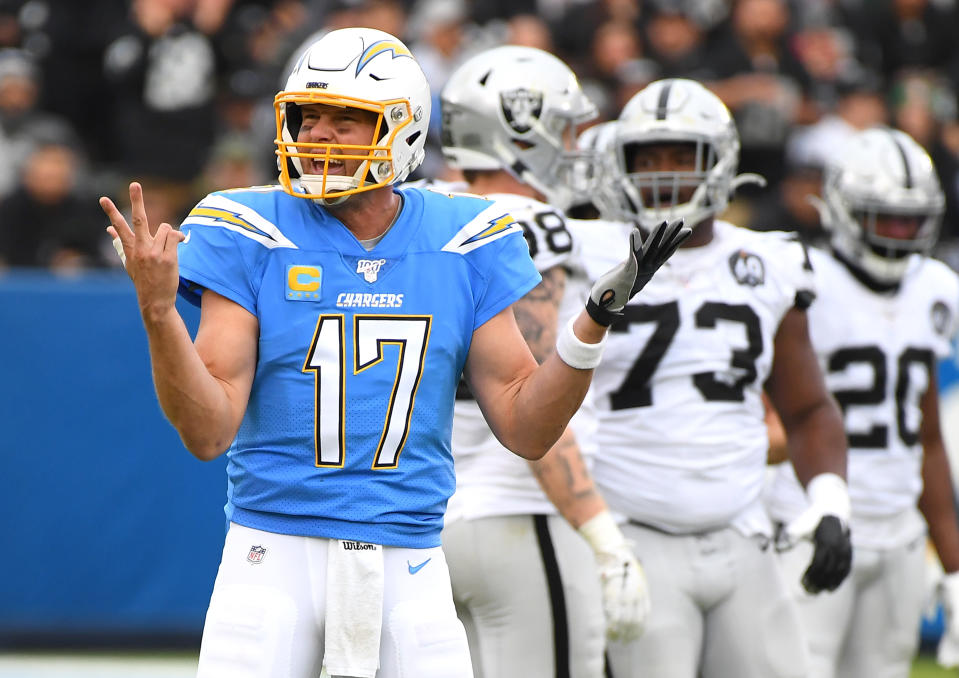Philip Rivers wonders: What if a player tests positive Super Bowl week?
As we navigate the post-COVID world, questions about athletes being tested — and the ramifications of it — are arising every day.
And new Indianapolis Colts QB Philip Rivers threw out a pretty interesting question, even if he’s asking a hypothetical for pretty far down the road.
#Colts QB Philip Rivers raised a big question on NFLPA call Friday: If a player tests positive for COVID-19 during Super Bowl week but is asymptomatic, would he have no choice but to sit?
Answer was yes -- but if he later has two negative tests 24 hrs apart, he could be cleared.— Tom Pelissero (@TomPelissero) July 6, 2020
Right now, the NFL is gearing up for the unknowns of training camp, so a Super Bowl question feels a wee bit premature. But it’s also the kind of thing league and team executives and employees, not to mention coaches and players, have on their minds.
And it’s becoming clear that time is no longer an asset for the NFL. We’re a little more than two months from the scheduled NFL opener, and yet we don’t even know if there will be preseason action at this point.
Beyond that, the debate about how many fans even will be in stadiums rages on — very little feels settled now.
Still, Philip Rivers’ question holds merit
The idea of a player — let’s say a starting quarterback — not able to play in a Super Bowl is the kind of jarring, season-altering issue that can’t be overlooked.
The NFL has started putting together a protocol for players being tested regularly and maintaining proper social distancing for training camps, and that’s all well and good. Perhaps these measures will be taken seriously and effectively unrolled.
The NFL and NFLPA are still finalizing testing protocols, but the expectation is players’ families — and anyone else players are cohabitating with — will be part of initial COVID-19 screening. All part of ecosystem they’ll rely on to make football work. @nflnetwork pic.twitter.com/tJUv9Whwr8
— Tom Pelissero (@TomPelissero) July 6, 2020
But once the season is underway, if it happens as scheduled, all bets are off. Players and coaches are expected to be allowed to travel to and from team facilities, and there will be travel for road games, of course. So the control of the experiment is essentially tainted if they’re exposed to people outside of their. football realms, including family members.
Even a typical 14-day lag time between the conference championship games to the Super Bowl doesn’t ensure proper cover if players are exposed at any point almost immediately after those games.
On top of that, there’s the matter of the schedule itself — if any games are lost or the schedule is condensed, will that two-week window still exist? Would the league consider pushing back the Super Bowl? That’s a whole other tangled web of possibilities that could arise.

Then there’s the issue of testing: false positives and false negatives and, it’s got to be said, the idea of tampered testing. We’d like to think that these procedures can’t be circumvented, but putting that past a league of highly competitive and cutthroat performers feels dismissive.
Plus, on a more benign level, what happens if and when conditions related to COVID-19 change?
Essentially, what Rivers asked raised a good procedural concern about what might happen if a player initially tests positive. It was smart of him to do so and fair to bring up now, even if we’re quite a ways off from that point.
But the worry is that with so many unknowns at this point, Rivers’ question might end up being moot by the time we arrive there. And, yes, even if we arrive there.
More from Yahoo Sports:
